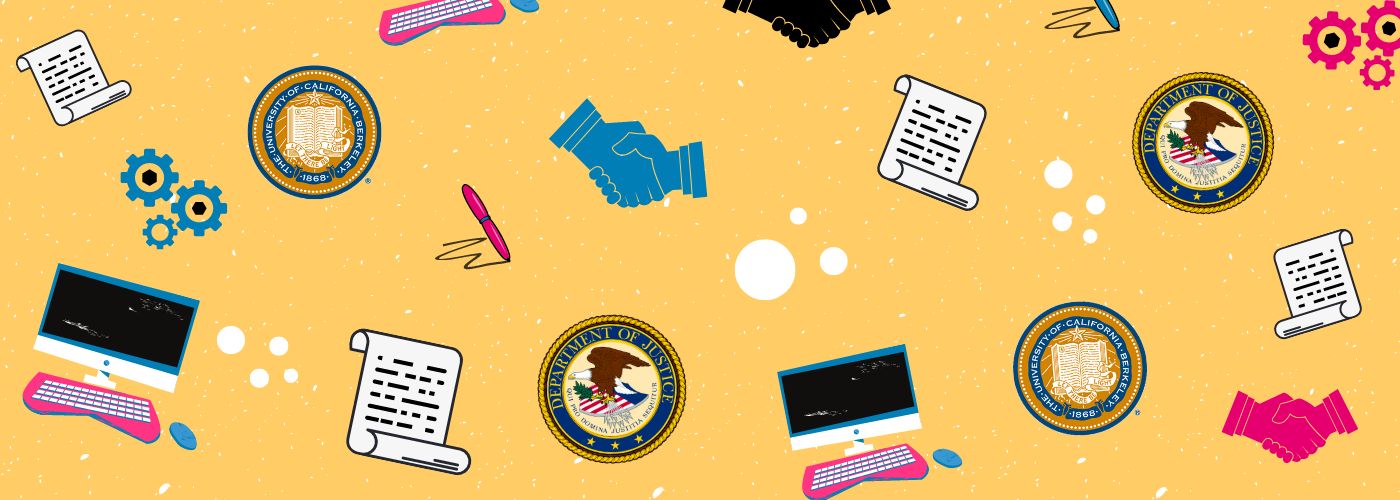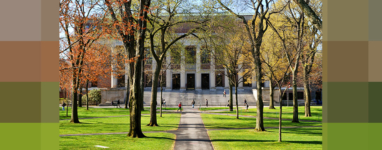Takeaways from UC Berkeley’s Consent Decree with the DOJ
Updated: February 14, 2023
How the ADA Impacts Online Video Accessibility [Free eBook]
After an eight-year investigation into the accessibility of UC Berkeley’s online content, the university and the Department of Justice (DOJ) finally came to an agreement: UC Berkeley will ensure its free online content is accessible to learners with a range of disabilities. A consent decree was approved on December 2, 2022, effective immediately.
While the DOJ’s investigation began with a complaint about a lack of closed captions, it expanded to address media and web accessibility for all learners. Read on to learn more about the background of the investigation and the far-reaching impact of the consent decree.
Catch Up Quick
The DOJ agreement is the outcome of a 2014 complaint submitted by the National Association of the Deaf (NAD) alleging that many of the school’s online courses, lectures, and other content were inaccessible to people who are D/deaf or hard of hearing due to a lack of closed captions. At the time, massive open online courses (MOOCs) were gaining in popularity at universities across the country; however, many universities were not considering accessibility in their online content.
The NAD argued that UC Berkeley violated Title II of the Americans with Disabilities Act (ADA), which prohibits discrimination on the basis of disability by public entities. The government determined that the complaint was valid and notified UC Berkeley that it needed to address and eliminate its ADA violations.
In response to the government’s Letter of Findings on August 30, 2016, UC Berkeley disagreed with the verdict and maintained that the school had “invested substantially in improving the accessibility of its online content.” Rather than complying with the accessibility order, UC Berkeley began removing more than 20,000 video and audio lectures from public view in 2017. By 2021, the DOJ said that UC Berkeley had still not addressed many of its accessibility barriers.
UC Berkeley’s poor web accessibility may surprise those who are aware of its revolutionary history. The Rolling Quads, a community of quadriplegic students in the 1960s, transformed UC Berkeley into one of the most physically accessible college campuses in the country at the time. The Rolling Quads also established the independent living movement, which expanded into a national effort that included the Section 504 sit-in and resulted in improved rights for the American disability community.
However, as many other lawsuits have shown, compliance with the ADA or other disability rights laws for physical structures does not prevent an organization from being sued for an inaccessible digital presence.
Multiple other universities have been sued under remarkably similar circumstances for inaccessible online content. Cases such as NAD v. MIT and NAD v. Harvard were triggered by the universities’ inaccurate auto captioning on their free online programming and platforms, such as YouTube, iTunesU, Harvard@Home, and MIT OpenCourseWare. MIT and Harvard eventually reached settlements with the NAD that strengthened digital accessibility policies and required accurate captions.
The Consent Decree
What began as an investigation into closed captions for UC Berkeley’s online content now has a much wider scope, going beyond captions and addressing accessibility measures that account for people with all types of disabilities.
While the initial investigation was only concerned with UC Berkeley’s MOOC, the resulting consent decree expands beyond UC BerkeleyX to all other entities at the university. The consent decree impacts both backlog and new content, establishing different timelines for both categories of content.
The DOJ agreement applies to UC Berkeley-controlled online content that falls into these three categories:
- Publicly accessible websites on berkeley.edu and subdomains
- UC Berkeley’s MOOC, UC BerkeleyX
- Content published by UC Berkeley on third-party platforms such as YouTube, Spotify, or Apple Podcasts
Impact on Backlog Content
Backlog content is content published before the consent decree went into effect. It includes all of the content that UC Berkeley refused to caption and describe after the initial investigation and all existing content published by other entities at UC Berkeley.
Within 9 months of the consent decree’s approval (by September 2023), all of UC BerkeleyX’s content, including audio and video, must conform to WCAG 2.0 Level AA.
To comply with WCAG 2.0 Level AA and ensure equal access for individuals with a range of disabilities, UC Berkeley must implement closed captions, audio description, alternative text, and other accessibility best practices.
Content on UC Berkeley’s website and its subdomains must conform to WCAG 2.0 Level AA within 18 months of approval (by June 2024); however, audio and video content made publicly available on the website prior to court approval must conform within 36 months (by December 2025).
All audio and video content that UC Berkeley published on public podcast platforms prior to December 22, 2022, must also conform to WCAG 2.0 Level AA within 36 months (by December 2025).
Other audio and video content hosted on a third-party platform that was either made publicly available within the 2 years preceding the consent decree’s approval or had at least 750 views as of December 22, 2022, must conform to WCAG 2.0, Level AA within 36 months (by December 2025).
Impact on New Content
New content is any content that has been made publicly available after the Court approved the consent decree in 2022. A university of this size regularly creates and publishes new educational material. Therefore, ensuring that all new content is accessible is also a big undertaking.
Within 9 months of the consent decree’s approval (by September 2023), video and audio content on UC Berkeley’s website and subdomains, as well as third-party platforms, must conform to WCAG 2.0 Level AA. This includes providing closed and live captions, audio description, alternative text, resizable text, and more.
UC Berkeley will also be required to implement updated accessibility procedures, designate a web accessibility coordinator, conduct annual internal accessibility testing and training to those who handle online content on UC Berkeley’s behalf, provide an effective method of receiving and responding to feedback and requests from users, and hire an external auditor to review the accessibility of its content.
UC Berkeley must report to the DOJ every 6 months on the state of its compliance during the 42 months the consent decree is in effect.
Learn How the ADA Impacts Online Video Accessibility➡️
Implications for Educational Institutions
1. The consent decree provides a framework for how organizations and universities should approach making backlog and new content accessible.
Through the consent decree, the DOJ has made known its opinion about how organizations should handle web accessibility. The consent decree answers many questions about how to prioritize different types of content, providing clear guidelines on handling backlogs and new content. It additionally offers detailed timelines for each guideline based on specific content and platform type.
By referencing WCAG as the accessibility standard, the DOJ ensures that UC Berkeley in its entirety has clearly defined criteria to meet for captions, alternative text, audio description, and more. The consent decree can help organizations that are implementing media accessibility measures determine how to take action. For organizations trying to prioritize accessibility, this consent decree suggests taking these steps:
- If any part of your org has been a part of litigation, start by making all media associated with that entity fully accessible.
- Next, prioritize new content across all entities and platforms, including third-party platforms.
- Build a work-back plan to achieve WCAG 2.0 level AA compliance across all backlog content, with a target date by which you aim to have the backlog completely accessible.
2. YouTube’s auto captions alone are not accurate enough for accessibility.
UC Berkeley’s YouTube channel, which houses thousands of videos spanning a range of topics, was deemed inaccessible because they either lacked captions or relied solely on YouTube’s auto-generated captions. “Although UC Berkeley can remediate inaccurate or incomplete automatic captioning rendered by YouTube,” said the DOJ, “UC fails to do so.” The consent decree reinforces the importance of accurate captions and the problems that arise when auto captions aren’t remediated.
YouTube’s auto captions are notoriously inaccurate, which makes them inaccessible and detrimental to educational content. While inaccurate captions can prevent a student who is d/Deaf or hard of hearing from comprehending content, they can also impact hearing students: 80% of people who use captions aren’t d/Deaf or hard of hearing. Students use captions to improve learning comprehension and retention and stay engaged with lessons. Students with and without hearing loss rely on accurate captions as they learn material; reading inaccurate information makes learning difficult and sometimes impossible.
3. The DOJ will continue to conduct investigations and push WCAG as the national standard for web accessibility.
The COVID-19 pandemic pushed much of our lives online, including education. Though WCAG and other accessibility standards have been around for years or sometimes decades, their enforcement has increased exponentially in recent years. The pandemic has cemented online learning material as a significant part of the educational landscape and led to increased awareness of accessible online content, with WCAG as the standard.
The Biden administration has also demonstrated a growing focus on web accessibility and contributed to its enforcement. The administration released a statement declaring its dedication to web accessibility:
Our ongoing accessibility effort works towards conforming to the Web Content Accessibility Guidelines (WCAG) version 2.1, level AA criteria. These guidelines not only help make web content accessible to users with sensory, cognitive and mobility disabilities, but ultimately to all users, regardless of ability.
While the consent decree only directly impacts UC Berkeley, it sends a message that the DOJ will continue to monitor whether other educational institutions are providing accessible content. The structure of the consent decree gives a sense of how the DOJ might react if it encounters an educational institution that’s publishing inaccessible content and suggests that the DOJ’s future recommendations will include WCAG.
4. Compliance with one accessibility requirement doesn’t protect organizations from other disability rights litigation.
The original investigation into UC Berkeley was concerned with a lack of captions on UC BerkeleyX for people who are d/Deaf or hard of hearing. The agreement expanded to include digital accessibility for people with physical disabilities or who are blind or low vision, in addition to those with hearing loss, at the entire organization of UC Berkeley.
While much of UC Berkeley’s online content is currently inaccessible to folks with a range of disabilities, any organization that captions its content is not protected from, for example, litigation requiring audio description, or vice versa. Accessibility measures must consider the needs of all users, including those with different disabilities.
5. The ADA includes podcast accessibility.
The consent decree specifically mentions that UC Berkeley’s podcasts must conform to WCAG 2.0 Level AA, meaning audio-only content must be transcribed. Litigation around podcast accessibility has been steadily growing, and the consent decree includes podcast transcription under the ADA as required by WCAG 2.0 Level AA. Any other educational institution creating podcasts should take note and ensure episodes are accurately transcribed.
6. The sooner you begin your accessibility journey, the easier and less litigious it will be.
Because UC Berkeley failed to implement accessibility measures before the government got involved, the school has a substantial backlog of inaccessible content. UC Berkeley’s now sizable accessibility project provides a tale of caution to organizations that are prolonging or avoiding accessibility. The failure to add captions also resulted in a significant expansion of the consent decree’s covered entities, encompassing the entirety of UC Berkeley.
If you find yourself in a similar situation, there are resources for you. Certain media accessibility providers, such as 3Play Media, are well suited to handle extensive archives of content. An effective captioning and audio description vendor will help you get up to speed by providing you with a navigable platform, great support, and a high-quality output.
The DOJ’s expansive agreement with UC Berkeley is a big step forward for digital accessibility in higher education. Online learning materials are constantly evolving and growing, and it’s imperative that everyone has equal access.
This blog post is written for educational and general information purposes only, and does not constitute specific legal advice. This blog should not be used as a substitute for competent legal advice from a licensed professional attorney.





